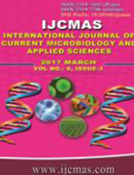


 National Academy of Agricultural Sciences (NAAS)
National Academy of Agricultural Sciences (NAAS)

|
PRINT ISSN : 2319-7692
Online ISSN : 2319-7706 Issues : 12 per year Publisher : Excellent Publishers Email : editorijcmas@gmail.com / submit@ijcmas.com Editor-in-chief: Dr.M.Prakash Index Copernicus ICV 2018: 95.39 NAAS RATING 2020: 5.38 |
Wheat (Triticum aestivum) is the second most important food crop in India only after rice and providing food for about 2 billion people which is about 36% of the world population. Annual production of wheat and rice together should be increase by 2 mt every year in order to maintain self-sufficiency for wheat in India. The demand of wheat is projected to be 109 mt by 2020 in India. Globally, the demand for wheat by the year 2020 is forecasted to be around 950 mt. This target will be achieved only, if the global wheat production would be increase by 2.5% per annum. This must be achieved under reduced water availability, a scenario of climate change and increasing the temperature mainly at the time of reproductive stage. The major factors behind yield plateau are different kinds of abiotic stresses which significantly restrict from expressing the full yield potential of existing wheat varieties/ genotypes and are eventually seen into reduces or stagnated the actual yield production. Major problem faced by the wheat-growing areas of South Asia is high temperature stress and terminal heat stress. Some possible ways to break the yield plateau under these kinds of abiotic stresses are to identifying the allelic sources for heat tolerance and their introgression into elite lines through conventional breeding, modern biotechnological and molecular tools are an important area for future research. A novel approach in plant breeding for tolerance to abiotic stresses is to identify the genomic reasons strongly associated with resistance/ tolerance and further utilization thereof to develop resistant/tolerant genotypes along with appreciable yield performance. Hence, this review briefly explains about to explore the updated information and tagging/mapping of genes/QTLs for heat tolerance in wheat to be used for crop improvement under breeding for mankind.
 |
 |
 |
 |
 |